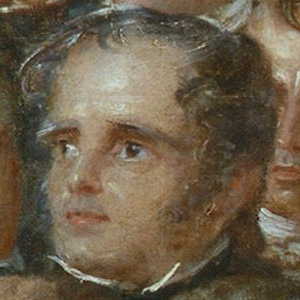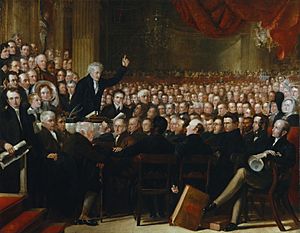John Jeremie facts for kids
Quick facts for kids
Sir John Jeremie
|
|
|---|---|

Jeremie in 1840
|
|
| Born | 19 August 1795 |
| Died | 23 April 1841 (aged 45) Port Loko, Sierra Leone
|
| Nationality | British |
| Education | Dijon, France |
| Occupation | Diplomat, judge, ruler |
| Parent(s) | John Jeremie |
Sir John Jeremie (born August 19, 1795 – died April 23, 1841) was an important British judge and diplomat. He served as the top judge in Saint Lucia and later as the Governor of Sierra Leone. He was recognized in 1836 for his work in helping "negro freedom." This happened after he accused judges in Mauritius of being unfair. He understood that unfair treatment based on skin color and slavery were separate issues.
Contents
Early Life and Education
John Jeremie was born on the British island of Guernsey in 1795. His father, also named John Jeremie, was a lawyer. Young John went to Blundell's School in Devon, England. After that, he studied law in Dijon, France. His father passed away in Malta in 1810. John became a lawyer in his home island and was very successful. He even published a law book that his father had written before he died.
Working in Saint Lucia
In 1824, Jeremie was chosen to be the Chief Justice (the main judge) of Saint Lucia. He held this job until 1831. During this time, he had to apply the laws about slavery that existed in the British Empire. Even though the buying and selling of enslaved people (the Atlantic slave trade) had been stopped, slavery itself was still legal in some places.
Jeremie was involved with the issue of slavery throughout his life. He wrote four essays called Colonial Slavery. In these essays, he talked about the problems faced by enslaved communities. He also highlighted improvements made in Saint Lucia. He even gave advice on how to end slavery completely. These writings became well-known in Britain. Many people believe his work helped lead to the end of slavery.
Challenges in Mauritius
In 1832, Jeremie was appointed as the main lawyer and public prosecutor for the island of Mauritius. This was a very difficult job. In 1830, the Governor, Sir Charles Colville, had reported that there was "a great deal of bad feeling" against the British government. People were even refusing to pay taxes.
Jeremie arrived in Mauritius in June 1832. He was known as someone who wanted to end slavery. Because of this, many people there were very hostile towards him. It was so bad that he needed armed guards just to get off his boat. The local judges refused to show up to officially appoint him. He was even attacked by a crowd in the street.
Governor Colville sent him back to Britain. But Jeremie was sent back to Mauritius the next year. Problems continued, and people kept making accusations about his actions. In 1833, he accused the judges of being unfair and involved with slavery. The governor did not support him, so Jeremie resigned again and left on October 28, 1833. His actions were later supported in his 1835 report, "Recent Events at Mauritius."
"In the last three years, he has traveled fifty thousand miles. He faced attackers on land and pirates at sea. For ten years, he has faced every danger in the King's service. This includes dangers from the ocean, the climate, or other people."
Jeremie realized that slavery would soon be illegal. He also predicted that other laws based on skin color prejudice would cause more problems. He asked for these unfair laws to be removed.
"Ten years ago, a big and hurtful legal difference existed between free people in our colonies with enslaved people. This was the distinction of color. People said it was part of society and could not be changed."
Service in Ceylon
On October 2, 1835, Jeremie was appointed as a junior judge of the Ceylon Supreme Court. He started this job on December 9, 1836. In the same year, the Anti-Slavery Society honored him. They gave him a plaque that said:
The Honourable John Jeremie
one of his Majesty's Justices of the
Supreme Court of the island of Ceylon etc etc
By whose inflexible adherence to right principle
under circumstances of unparalleled difficulty
while discharging high official duties in the
colonies of either hemisphere and by whose
disinterested able and energetic exertions
in most critical and painful situations
both at home and abroad Negro Freedom
has been largely advanced
and the negro character raised to its just standard in public estimation.
This tribute of affectionate respect
is given by his coadjutors in the anti slavery cause 2 July 1836.
Jeremie was in London to attend the World's anti-slavery convention on June 12, 1840. This event brought together people from many countries.
Jeremie later wrote about his time in Ceylon. Others were worried that he had accepted a job as Governor in Sierra Leone. He seemed to have a feeling about what might happen.
"Governors do die in Sierra Leone. But I served six years in one of our West Indian governments. There, four governors died in about as many years: General Stewart, General Mackie, Colonel Maret, and General Farquharson. It was also my job to swear in two captains, a major, and a colonel as governors within a month. This happened because the government leadership went to the most senior officer. The last of these was replaced by my friend General Mackie from England, who died within eight weeks. I am now the only one left of the three judges who were on the Supreme Court of Ceylon when I joined on December 9, 1836."
Governor of Sierra Leone and Final Years
On October 15, 1840, John Jeremie was appointed Governor of Sierra Leone. This was a great honor, but it also came with health risks. He was confident, as shown in his quote above. He noted that he survived six years in Ceylon and outlived the other judges there.
He was made a knight on November 15, 1840, before he left for Africa. His only daughter, Catherine, got married in March 1841. Sir John Jeremie died at Port Loko in Sierra Leone from a fever. This happened after only a few months in Africa. He is buried in Circular Road Cemetery.
Works and Legacy
Sir John Jeremie edited his father's legal book, which was written in French. He also wrote an open letter in June 1840 called "Negro Emancipation and African Civilization." His work helped to advance freedom and equality for many people.
 | Claudette Colvin |
 | Myrlie Evers-Williams |
 | Alberta Odell Jones |


